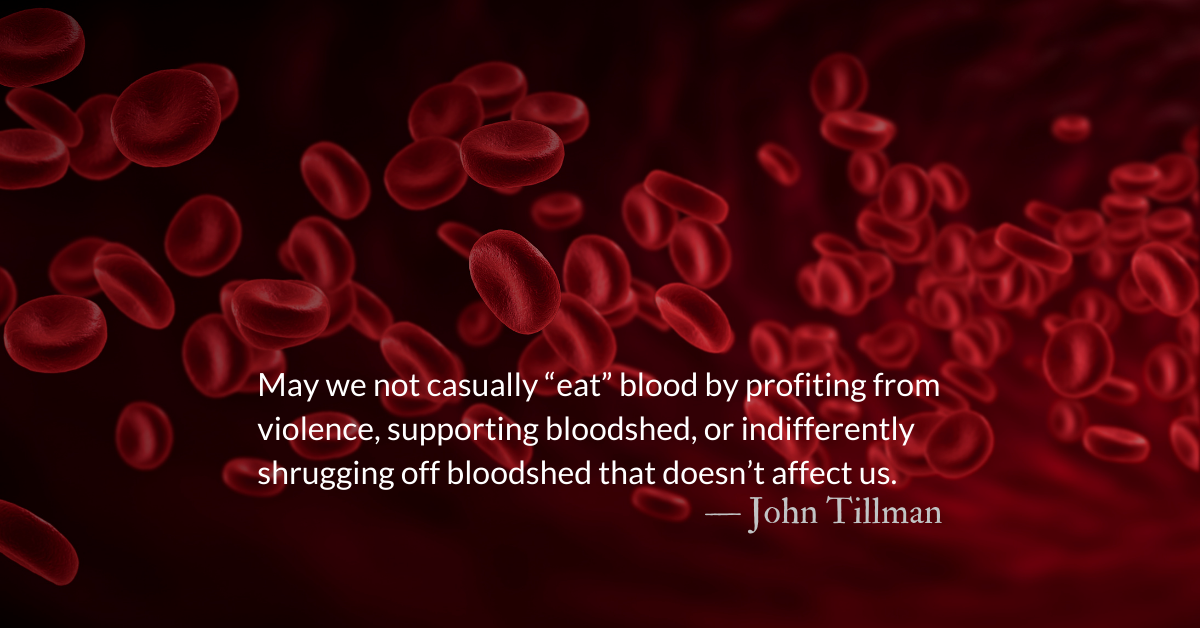Readers’ Choice Month:
In August, The Park Forum looks back on our readers’ selections of our most meaningful and helpful devotionals from the past 12 months. Thank you for your readership. This month is all about hearing from you. Submit a Readers’ Choice post today.
Today’s post was originally published, February 4th, 2021, based on readings from Genesis 37 and Mark 7.
It was selected by reader, Brian
“Thanks for this reflection. My desire for vengeance ruled my life until I was in my late-20’s.
I kept a mental note of each person who hurt me and dreamt about what I would do as payback. Finally God pulled the desire for vengeance out of me. It took years of counseling, prayer, and patience from all who loved me. Whew. I am exhausted writing this. Thanks again. Thanks be to God for unyielding and unending mercy.”
Scripture Focus: Genesis 37.34-35
34 Then Jacob tore his clothes, put on sackcloth and mourned for his son many days. 35 All his sons and daughters came to comfort him, but he refused to be comforted. “No,” he said, “I will continue to mourn until I join my son in the grave.” So his father wept for him.
Mark 7.20-23
20 He went on: “What comes out of a person is what defiles them. 21 For it is from within, out of a person’s heart, that evil thoughts come—sexual immorality, theft, murder, 22 adultery, greed, malice, deceit, lewdness, envy, slander, arrogance and folly. 23 All these evils come from inside and defile a person.”
Reflection: Vengeance, Arrogance, and Partiality — Readers’ Choice
By John Tillman
There are disagreements among biblical interpreters about Joseph and how he related to his brothers.
Some see Joseph as innocent. They argue Joseph did nothing wrong. His brothers are simply vengeful and jealous. This view’s popularity comes partly from seeing Joseph as a “type” of Christ in the Old Testament. (Where Moses shows us the conquering Christ, Joseph shows us the suffering servant.) Joseph, however, is no more sinless than Moses or anyone else. This view seems unrealistically idealistic.
Some see Joseph as a spoiled, arrogant braggart. They argue that, although Joseph was a victim, he provoked his brothers to anger and jealousy. This view is more realistic but problematic for blaming the victim.
Some blame Israel’s parenting and favoritism. They argue that Israel’s partiality humiliated his older sons and spoiled his younger. This view only shifts the blame to prior generations, absolving the descendants.
Seeing any biblical character, other than Jesus, as blameless is a bad idea. Rather than one person or group, all involved in this dysfunctional drama are blameworthy in different ways.
Malefactors are responsible for their actions, regardless of provocation or incitement. Joseph’s brothers have no excuse even if he had been the worst braggart and spoiled brat that ever existed.
Joseph is also not innocent. The scripture gives us an important clue about this when even Israel rebukes Joseph after being disturbed when Joseph shared his dreams. Joseph’s words and manner of sharing his dreams must have been far out of line for his doting father to take him down a peg about it.
Finally, Israel reaps the consequences of his partiality when he mourns Joseph. It is the fruit of the seeds of division that he planted and he must sip its sour wine for years.
Were the brothers vengeful and jealous? Yes, and so are we.
Was Joseph prideful and insensitive to the effect of his privileges? Yes, and so are we.
Was Israel blind to his partiality and the harm it was causing? Yes, and so are we.
The actions of everyone involved grew from their inner sinfulness. What comes out of a person is what defiles them, not what happens to them. What we do and say is an overflow of our hearts.
May our hearts find hope and be changed by our suffering servant Jesus.
May we find in Jesus forgiveness to replace our vengeance, humility to replace our arrogance, and justice to replace our partiality.
Divine Hours Prayer: The Call to Prayer
Love the Lord, all you who worship him; the Lord protects the faithful, but repays to the full those who act haughtily. — Psalm 31.23
– Divine Hours prayers from The Divine Hours: Prayers for Springtime by Phyllis Tickle
Today’s Readings
1 Samuel 3 (Listen – 3:03)
Romans 3 (Listen – 4:30)
This Weekend’s Readings
1 Samuel 4 (Listen – 3:56), Romans 4 (Listen – 4:08)
1 Samuel 5-6 (Listen – 6:03), Romans 5 (Listen – 3:53)
Read More about Readers’ Choice 2021
Have we heard from you yet? Tell us about posts from the past year (September 2020 – July 2021) that have helped you in your faith.
https://forms.gle/ozM13qvW9ouSWhJS7
Read more about Humbling Nebuchadnezzar
Humility will save you and your nation. Pride will destroy you and your nation.











